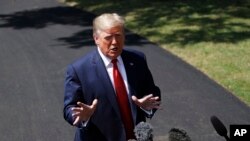President Donald Trump said Thursday that the U.S. plans to reduce the number of American troops in Afghanistan from 14,000 to 8,600 and then will determine further drawdowns.
Trump's comment came as a U.S. envoy continued talks with the Taliban to try to find a resolution to the nearly 18-year war. The president said the U.S. was "getting close" to making a deal, but that the outcome was uncertain.
"Who knows if it's going to happen?" Trump told Fox News Radio's The Brian Kilmeade Show.
No timeline
Trump did not offer a timeline for withdrawing troops. The Pentagon has been developing plans to withdraw as many as half of the 14,000 U.S. troops still there, but the Taliban want all U.S. and NATO forces withdrawn.
"We're going down to 8,600 and then we'll make a determination from there," Trump said, adding that the U.S. would have a "high intelligence" presence in Afghanistan going forward.
Trump has called Afghanistan — where the Taliban harbored members of the al-Qaida network responsible for the Sept. 11, 2001, terrorist attacks on the United States — the `"Harvard University of terror."
If terror groups ever attacked America from Afghanistan again, "we will come back with a force like they've never seen before," Trump said. But he added: "I don't see that happening."
The top U.S. military officer said Wednesday that it was too early to talk about a full American troop withdrawal from Afghanistan. Gen. Joseph Dunford, chairman of the Joint Chiefs of Staff, told Pentagon reporters that any U.S. deal with the Taliban would be based on security conditions on the ground and that Afghan forces weren't yet able to secure the country without help from allied forces.
"I'm not using the 'withdraw' word right now," Dunford said. "It's our judgment that the Afghans need support to deal with the level of violence'' in the country today.
Afghanistan's government expects that U.S. envoy Zalmay Khalilzad will soon update officials in Kabul on the progress of peace talks with the Taliban.
Attacks continue
A Taliban spokesman also has said that they're close to a final agreement. But even as the talks go on, there are persistent attacks by the Taliban across Afghanistan, and an affiliate of the Islamic State group has taken hold in the country and has been expanding its base.
Even if Khalilzad is able to close a deal, it will remain for the Afghan government to negotiate its own peace agreement with the Taliban. Part of those talks will be determining a role for the Taliban in governing a country that it ruled before U.S. forces invaded in October 2001.





